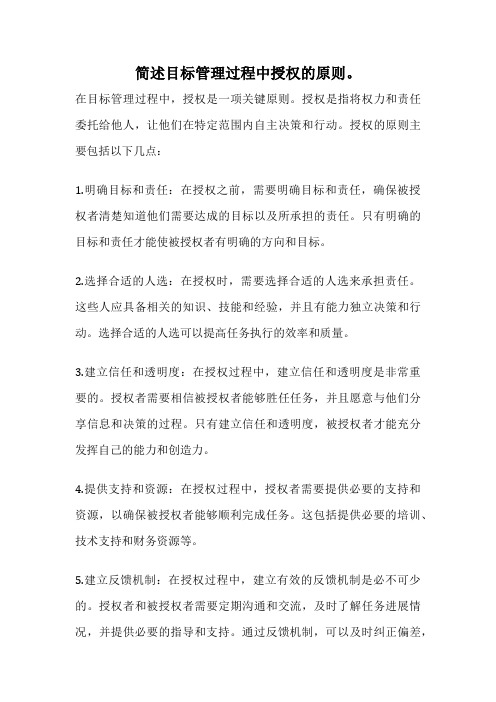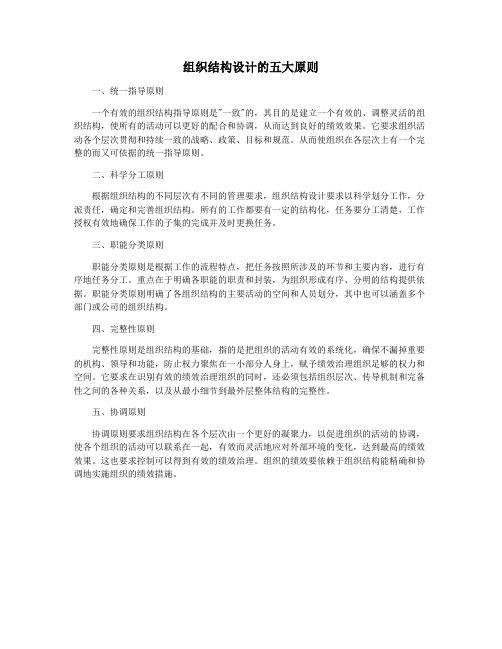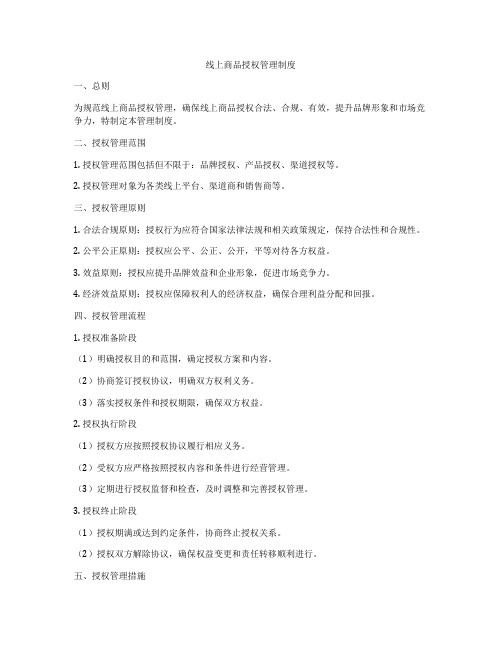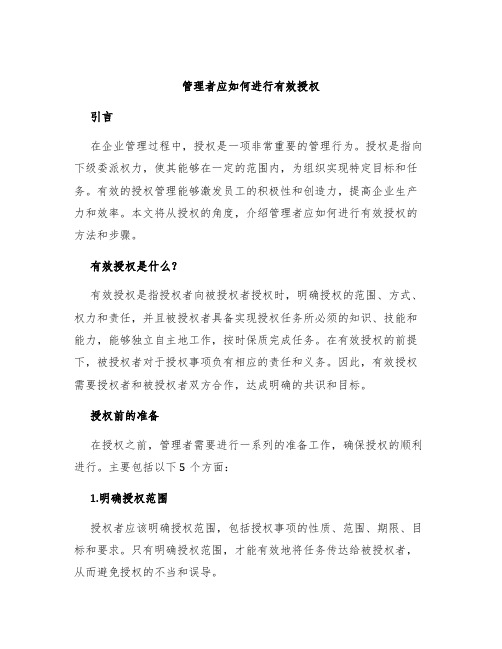有效授权的指导原则
医院授权管理制度

医院授权管理制度1. 引言医院作为医疗服务提供者,为了保障患者的权益和提供优质的医疗服务,需要确立一套规范的授权管理制度。
医院授权管理制度的制定旨在明确授权的范围、程序和要求,保障医院内部授权的合法性和有效性,促进医院运营的规范和有效。
2. 授权管理的定义授权管理是指医院在特定情况下委托或授予相应的权限、职责和资源给特定的个人或部门,以便其能够有效地履行工作职责和为患者提供医疗服务。
3. 授权管理的原则合法性原则授权行为必须符合法律、法规和医院规章制度的要求。
操作性原则授权过程应简化、高效,并确保操作的便捷性和灵活性。
透明度原则授权的范围、条件、期限等应公开透明,避免信息不对称和利益冲突。
审批制度原则授权的决定必须经过层层审批,并确保授权人的资质和能力。
监督制度原则对授权行为进行持续监督和评估,确保授权的合法性和有效性。
4. 授权的程序授权管理的程序主要包括申请、审批和登记等环节4.1 申请医务人员或部门需要获得特定权限时,应向授权管理部门提交申请。
申请内容包括但不限于申请人的个人信息和职称资质证明授权的理由和目的所需权限和资源的具体要求。
4.2 审批授权管理部门收到申请后,根据医院的规定和职权范围进行审批。
审批的内容包括但不限于申请人的资质和能力评估授权的合法性和必要性评估授权的范围和条件确定审批意见和决策结果。
4.3 登记授权管理部门在审批通过后,应将授权的信息登记并归档。
登记内容包括但不限于授权人和被授权人的基本信息授权的范围和条件授权的有效期限授权的修改和撤销记录。
5. 授权管理的要求5.1 安全性要求医院应采取必要措施确保授权行为的安全性,包括但不限于严格的身份验证和权限管理机制授权信息的加密和存储安全保障防止未授权操作和权限泄露的措施。
5.2 信息保密要求医院授权管理涉及大量患者和医务人员的敏感信息,应加强信息保密措施,包括但不限于严格的信息访问权限控制控制授权信息的传输和存储监测和防范信息泄露和滥用的措施。
企业的授权体系框架-概述说明以及解释

企业的授权体系框架-概述说明以及解释1.引言1.1 概述企业的授权体系框架是指企业在运作过程中建立的一套授权管理体系,用于规范和管理企业内部人员的权限和访问权限。
这个框架包括了一系列的规定和流程,以确保企业的资源和信息得到有效的保护和管理。
随着企业规模的扩大和业务的复杂化,授权管理变得越来越重要。
一个合理有效的授权体系框架可以帮助企业确保资源的合理分配和使用,防止资源的滥用和泄露,同时也能提高企业的运营效率和安全性。
在企业授权的概念中,首先需要明确哪些资源和信息是需要被授权管理的。
这些资源可以包括企业内部的各类应用系统、数据库、文件夹等,而信息则包括企业的机密信息、知识产权等。
对于这些资源和信息,企业需要明确各个角色和人员在其中的权限和责任。
在建立授权体系框架时,企业需要考虑以下几个方面:首先是权限的分级和分类,即根据不同的岗位和角色划分相应的权限,实现权限的分层管理;其次是权限的赋予和撤销,即明确授权的过程和流程,确保权限的获取和取消都是经过合理的途径和授权;最后是权限的监控和审计,即对权限的使用情况进行实时监控和审计,确保权限的合规和安全。
企业授权体系框架的建立并不是一蹴而就的过程,需要企业逐步明确和完善。
整个过程需要企业的高层领导的重视和支持,同时也需要全体员工的积极配合。
只有做好企业的授权管理,企业才能保证资源的有效利用和信息的安全,提升竞争力和发展潜力。
1.2 文章结构本文将分为三个主要部分来讨论企业的授权体系框架。
首先,在引言部分将对本文的主题进行概述,并介绍文章的结构和目的。
其次,在正文部分将详细讨论企业授权的重要性、基本原则以及实施步骤。
最后,在结论部分将总结企业授权体系框架的重要性,展望其未来的发展,并得出结论。
引言部分是本文的开篇之作,主要目的是引导读者对企业授权体系框架有一个整体的认识。
在概述中,将介绍企业授权的定义和背景,以及其在现代商业环境中的重要性。
接下来,将详细说明本文的结构,给出各个章节的简要介绍,以帮助读者对全文的阅读有一个清晰的指导。
物流公司授权管理制度内容

物流公司授权管理制度内容一、总则1. 为加强公司内部管理,明确各级管理人员的权责,根据公司实际情况制定本授权管理制度。
2. 本制度适用于公司所有部门及员工,任何管理行为均应遵循制度规定的原则和程序。
二、授权原则1. 授权必须明确具体,不得含糊或过度宽泛。
2. 授权应基于员工的岗位职责、能力和业绩表现。
3. 授权应当与公司的经营目标和管理要求相一致。
三、授权级别1. 一级授权:涉及公司重大战略决策、重要合同的签订等,由董事会或总经理批准。
2. 二级授权:日常经营管理中的重要事项,如大额资金调拨、重要人事任免等,由相关部门负责人审核,报请总经理批准。
3. 三级授权:常规业务流程中的一般性决策,可由各部门负责人在其权限范围内直接作出决策。
四、授权程序1. 提出申请:需授权的事项应由相关部门或个人提出书面申请,并详细说明授权的理由和预期效果。
2. 审核评估:上级主管应对申请进行审核,评估其合理性、可行性及风险。
3. 批准执行:经过评估后,若符合授权条件,由具有相应授权权限的人员批准执行。
4. 记录归档:所有授权行为应有完整记录,并进行归档保存,以便日后查询和审计。
五、授权监督1. 建立定期检查机制,对授权执行情况进行监督。
2. 对于超出授权范围的行为,应及时纠正并追究相关人员的责任。
3. 通过内部审计等方式,对授权效果进行评估,确保授权行为的合理性和有效性。
六、附则1. 本制度自发布之日起实施,由公司管理层负责解释。
2. 对于本制度未尽事宜,按照国家相关法律法规和公司其他管理制度执行。
3. 本制度如有更新,应及时通知全体员工并做好培训工作。
授权管理制度

授权管理制度标题:授权管理制度引言概述:授权管理制度是企业信息安全管理中的重要组成部份,它通过设定权限范围、规范操作流程、监控权限使用等方式,确保信息系统的安全性和合规性。
本文将从授权管理的定义、重要性、实施步骤、常见问题和解决方法以及未来发展趋势等方面进行详细介绍。
一、授权管理的定义1.1 确定权限范围:根据用户角色和职责,明确用户可以访问的资源和操作权限。
1.2 设定权限规则:建立权限管理策略,规定权限的授予、变更和撤销流程。
1.3 监控权限使用:实时监控用户权限的使用情况,及时发现异常行为。
二、授权管理的重要性2.1 保护信息安全:授权管理可以有效控制用户对敏感信息的访问权限,防止信息泄露。
2.2 合规要求:根据相关法律法规和行业标准,规范权限管理流程,确保企业合规性。
2.3 提升工作效率:合理授权可以使员工快速获取所需资源,提高工作效率。
三、授权管理的实施步骤3.1 制定授权管理政策:明确授权管理的目标、原则和流程,建立相关制度文件。
3.2 配置授权管理工具:选择适合企业规模和需求的授权管理工具,进行配置和部署。
3.3 培训和意识培养:对员工进行授权管理培训,提高他们的安全意识和合规意识。
四、授权管理的常见问题和解决方法4.1 权限过大:定期审查权限,及时调整权限范围,避免权限过大导致信息泄露风险。
4.2 权限滥用:监控权限使用情况,发现权限滥用行为及时进行处理,加强权限审计。
4.3 权限冲突:建立权限冲突检测机制,解决用户权限之间的矛盾,确保权限分配合理。
五、授权管理的未来发展趋势5.1 自动化管理:授权管理将趋向自动化,通过智能化工具实现自动授权和授权审批。
5.2 多因子认证:引入多因子认证技术,提高身份验证的安全性,加强授权管理的保障。
5.3 云端授权:随着云计算的发展,云端授权管理将成为未来的趋势,提高灵便性和便捷性。
结语:授权管理制度是企业信息安全管理的基础,惟独建立科学合理的授权管理机制,才干有效保护企业的信息资产和维护企业的安全稳定。
第五章 组织

管理学
20
(四)有效授权的原则
为了使授权有效,并且有利于组织目标的实现,应该坚持以下几个原则:
1.因事设人、视能授权原则 2.责任绝对性原则 3.权责相符的原则 4.分级原则 5.适当控制原则 6.不可越级授权原则
管理学
34
图5-12 矩阵型组织结构
35
管理学
表5-5 矩阵型组织结构的特点
类
特征型优点来自缺点适用组织矩 1.打破了传统的一个 1.加强了部门间的横向联 1.由于这种组织 一般适用于
阵 员工只有一个上司的 系,能克服职能部门互相 结构实行纵向和 外部环境变
型 命令统一原则,使得 脱节、各自为政的现象
管理学
21
(五)决定分权程度的因素
对于组织中的管理者来说,无论是赞成还是反对职权的分散,都 不得不采取分权思想,这种必要性是非常显而易见的。
1.决策问题的重要程度 2.组织的规模 3.组织的发展史 4.组织内部政策的一致性 5.管理者的指导思想 6.下级管理者的能力 7.控制能力 8.环境影响
管理学
4
四、组织工作的权变观
管理者在从事组织工作的过程中,应该树立组织工作 的权变观,即要认识到没有最好的组织结构形式,没 有最好的部门划分方法,也没有统一的管理幅度标准 ,组织的集权与分权取决于各种因素。
管理学
5
1.市场优势检验 2.管理优势检验 3.人员情况检验 4.可行性检验 5.特殊文化检验 6.协作难度检验 7.层级冗余度检验 8.责任检验 9.灵活性检验
22
五、不同的组织结构形式
通过以上的工作分工、部门化、管理幅度与管理层次的确 定,以及权力机制的设计等工作,各种各样的组织结构形式就 形成了。
简述目标管理过程中授权的原则。

简述目标管理过程中授权的原则。
在目标管理过程中,授权是一项关键原则。
授权是指将权力和责任委托给他人,让他们在特定范围内自主决策和行动。
授权的原则主要包括以下几点:
1.明确目标和责任:在授权之前,需要明确目标和责任,确保被授权者清楚知道他们需要达成的目标以及所承担的责任。
只有明确的目标和责任才能使被授权者有明确的方向和目标。
2.选择合适的人选:在授权时,需要选择合适的人选来承担责任。
这些人应具备相关的知识、技能和经验,并且有能力独立决策和行动。
选择合适的人选可以提高任务执行的效率和质量。
3.建立信任和透明度:在授权过程中,建立信任和透明度是非常重要的。
授权者需要相信被授权者能够胜任任务,并且愿意与他们分享信息和决策的过程。
只有建立信任和透明度,被授权者才能充分发挥自己的能力和创造力。
4.提供支持和资源:在授权过程中,授权者需要提供必要的支持和资源,以确保被授权者能够顺利完成任务。
这包括提供必要的培训、技术支持和财务资源等。
5.建立反馈机制:在授权过程中,建立有效的反馈机制是必不可少的。
授权者和被授权者需要定期沟通和交流,及时了解任务进展情况,并提供必要的指导和支持。
通过反馈机制,可以及时纠正偏差,
确保任务按时完成。
6.激励和奖励:在授权过程中,激励和奖励是激发被授权者积极性和创造力的重要手段。
授权者可以通过奖励制度、晋升机会和认可等方式,激励被授权者努力工作和取得成绩。
授权是目标管理过程中的重要原则之一。
通过合理的授权,可以充分发挥每个人的能力和潜力,提高工作效率和质量,实现组织的目标。
国有企业授权放权管理制度

国有企业授权放权管理制度第一章总则第一条为贯彻落实党中央、国务院关于国有企业改革的决策部署,依法规范国有企业授权放权管理,提高国有企业经营效益和社会效益,增强国有企业活力和竞争力,制定本制度。
第二条本制度适用于我国所有国有企业;国有企业包括国有独资企业、国有控股企业。
国有独资企业是指由国有资产全部出资或者控股股东是出资人,并具有企业法人资格的企业。
国有控股企业是指由国有资产部分出资或者控股股东是出资人,并具有企业法人资格的企业。
第三条国有企业授权放权管理应当遵循公开、公平、公正的原则,确保国有企业内部管理的科学性、合理性和公正性。
第二章授权放权基本原则第四条国有企业授权放权管理应当遵循以下基本原则:(一)政策指导原则。
坚持以市场为导向、以需求为依据、以效益为中心,根据国家发展战略和国有企业发展实际,明确授权放权的方向和重点。
(二)科学合理原则。
根据国有企业经营的具体特点,建立健全科学、合理的授权放权机制,确保授权放权的合理性和有效性。
(三)激励约束原则。
明确授权放权的责任和权力,并建立相应的激励约束机制,确保授权放权的稳定性和持续性。
(四)风险防控原则。
加强授权放权的监督和风险防控,确保国有资产和国有企业的安全。
第五条国有企业授权放权管理应当按照属地管理、事权明确、权限合理、权责对等、责权统一的原则进行。
第六条国有企业授权放权管理应当坚持集中和分散相结合,依法依规调整授权放权结构,同时保留国家和集中管理部门对国有企业的重要权力。
第七条国有企业授权放权管理应当加强对国有企业领导班子的建设和监督,提高国有企业领导干部的管理水平和责任意识。
第八条国有企业授权放权管理应当注重信息公开和参与民主监督,依法依规建立国有企业授权放权的公开透明机制。
第三章授权放权具体措施第九条国有企业在授权放权管理中,应当根据企业经营特点和管理需求,具体采取以下措施:(一)根据国有企业的经营规模、性质和经营范围,确定授权放权的层级和范围。
核心概念的意义

主题导览案例:你会怎么做?我宁可自己来做在阿莉西亚举办的晋升庆祝会上,她父亲切蛋糕时不得要领,因此她便自己拿起刀来去切。
这是要出事的征兆。
在几个月里,阿莉西亚每周工作70-80小时。
在一次她难得露面的星期日晚餐上,父亲让她一定要学会让其他人员去切那块蛋糕。
如果她想要成功,她必须把某些工作授权给他人去做。
但如果这些"他人"没做对,那该怎么办呢?父亲建议她首先放手一项很小的任务。
结果她接受了父亲的劝告,授权一位很可靠的员工萨姆去组织每季度的例行会议。
阿莉西亚对萨姆进行了指导。
开始,她拟定了一份与会者名单,并记录了她所了解到的每个人是否能够出席的情况。
为了保证萨姆能够顺利组织好这个会议,她草拟了一份会议日程表并制订了会议目标。
那天晚上11:00,阿莉西亚独自坐在办公室里,猛然想起授权这件工作比她亲自去干花的时间还要多。
更糟糕的是,她在不断扩大萨姆的职责权限,而萨姆却丝毫没有感激的表示。
阿莉西亚一定是在某些方面做错了。
到底是什么地方做错了呢?你会怎么做?我能够交给谁?特拉维斯一边读着电子邮件,一边跌回到椅子上。
邮件上说要将桑切斯的工作安排给他的部门去做。
通常,特拉维斯会立即把该项目交给克里斯去干,但他现在根本无法脱身,所以现在此路不通了。
特拉维斯想不出有谁能够担当起这项任务,而他又肯定没有时间亲自去做。
在一次关于本部门工作负荷的简短会议之后,吉尔突然闯进办公室,微笑着表示愿意承担该项工作。
特拉维斯对此却心存疑虑。
吉尔聪明伶俐、满腔热情,但克里斯已有10年工作经验,而吉尔的经验却只有3年左右。
两者的差别太大了,特拉维斯不愿意看到吉尔或他的部门遭遇失败,尤其是在为这家至关重要的客户服务的时候。
特拉维斯应当冒风险把这项工作交给吉尔去干吗?或者还有什么其它解决办法?你会怎么做?这比你想的更迟帕姆每天都要从伊萨克的办公桌旁走过几次,对他工作的方方面面提出建议并给予积极的评价。
帕姆以为这样做是一种好的管理方式。
组织结构设计的五大原则

组织结构设计的五大原则
一、统一指导原则
一个有效的组织结构指导原则是"一致"的,其目的是建立一个有效的、调整灵活的组织结构,使所有的活动可以更好的配合和协调,从而达到良好的绩效效果。
它要求组织活动各个层次贯彻和持续一致的战略、政策、目标和规范。
从而使组织在各层次上有一个完整的而又可依据的统一指导原则。
二、科学分工原则
根据组织结构的不同层次有不同的管理要求,组织结构设计要求以科学划分工作,分派责任,确定和完善组织结构。
所有的工作都要有一定的结构化,任务要分工清楚,工作授权有效地确保工作的子集的完成并及时更换任务。
三、职能分类原则
职能分类原则是根据工作的流程特点,把任务按照所涉及的环节和主要内容,进行有序地任务分工。
重点在于明确各职能的职责和封装,为组织形成有序、分明的结构提供依据。
职能分类原则明确了各组织结构的主要活动的空间和人员划分,其中也可以涵盖多个部门或公司的组织结构。
四、完整性原则
完整性原则是组织结构的基础,指的是把组织的活动有效的系统化,确保不漏掉重要的机构、领导和功能,防止权力聚焦在一小部分人身上,赋予绩效治理组织足够的权力和空间。
它要求在识别有效的绩效治理组织的同时,还必须包括组织层次、传导机制和完备性之间的各种关系,以及从最小细节到最外层整体结构的完整性。
五、协调原则
协调原则要求组织结构在各个层次由一个更好的凝聚力,以促进组织的活动的协调,使各个组织的活动可以联系在一起,有效而灵活地应对外部环境的变化,达到最高的绩效效果。
这也要求控制可以得到有效的绩效治理。
组织的绩效要依赖于组织结构能精确和协调地实施组织的绩效措施。
组织授权

组织授权授权与分权虽然都与职权下授有关,但两者是有区别的。
分权一般是组织最高管理层的职责,授权则是各个层次的管理者都应掌握的一门职能。
分权是授权的基础,授权以分权为前提。
一、授权分析1、授权的内容。
1)分派任务。
向被托付人交待任务。
2)委任权力。
授予被托付人相应的权力,使之有权处置原本无权处理的工作。
3)明确责任。
要求被托付人对托付的工作负全责。
授权并不是将职权放弃或让渡。
授权者也不会由于将职权授予别人而丧失它,授出的一切职务都可由授权者收回和重新授出。
2、授权的原则。
为使授权行为达到良好的效果,需要灵活掌握以下原则。
(1)重要原则。
授予下级的权限,要使下级认为是该层次比较重要的权限。
(2)明责原则。
授权时,必须向被授权者明确所授事项的责任、目标及权力范围,使之在规定的范围内有最大限度的自主权。
否则被授权者在工作中不着边际,无所适从,势必贻误工作。
(3)适度原则。
评价授权效果的一个重要因素是授权的程度。
授权过少,往往造成领导者的工作太多,下属的积极性受到挫伤;接受参谋过多,又会造成工作杂乱无章,甚至失去控制。
授权要做到下授的权力刚好够下属完成任务,不可无原则放权。
(4)不可越级授权。
越级授权是上层领导者把本来属于中间领导层的权力直接授予下级。
这样做,会造成中间领导层工作上的被动,扼杀他们的负责精神。
如果有时上层领导者越级授权是由于中层领导不力,也应该采用机构改革的办法予以调整。
否则,将导致机构混乱和争权夺利的严重后果。
3、授权的特点。
要正确理解授权的性质,必须把握授权中的几个具体特点。
4、授权的好处。
二、授权的心理障碍虽然很多经理人员都了解授权的必要性,但在实际工作中却往往难以授权和不愿授权,究其根本原因就在于,经理人员通常对于让部属对其行动负责具有一种心理上的障碍,因为经理人员原则上要负最后责任。
常见的心理障碍包括以下几方面。
1、害怕失去控制当经理人员将权责授予下属时,经理人员就无疑要承担风险。
线上商品授权管理制度

线上商品授权管理制度一、总则为规范线上商品授权管理,确保线上商品授权合法、合规、有效,提升品牌形象和市场竞争力,特制定本管理制度。
二、授权管理范围1. 授权管理范围包括但不限于:品牌授权、产品授权、渠道授权等。
2. 授权管理对象为各类线上平台、渠道商和销售商等。
三、授权管理原则1. 合法合规原则:授权行为应符合国家法律法规和相关政策规定,保持合法性和合规性。
2. 公平公正原则:授权应公平、公正、公开,平等对待各方权益。
3. 效益原则:授权应提升品牌效益和企业形象,促进市场竞争力。
4. 经济效益原则:授权应保障权利人的经济权益,确保合理利益分配和回报。
四、授权管理流程1. 授权准备阶段(1)明确授权目的和范围,确定授权方案和内容。
(2)协商签订授权协议,明确双方权利义务。
(3)落实授权条件和授权期限,确保双方权益。
2. 授权执行阶段(1)授权方应按照授权协议履行相应义务。
(2)受权方应严格按照授权内容和条件进行经营管理。
(3)定期进行授权监督和检查,及时调整和完善授权管理。
3. 授权终止阶段(1)授权期满或达到约定条件,协商终止授权关系。
(2)授权双方解除协议,确保权益变更和责任转移顺利进行。
五、授权管理措施1. 建立完善的授权管理机制,包括授权立项、审批流程、执行落实、监督检查等。
2. 设立专门的授权管理部门或分配专职人员,负责管理授权事务。
3. 制定授权管理规章制度,明确各方权责,确保授权管理顺利实施。
4. 加强对授权方和受权方的定期监督和考核,做好风险防范和管理。
5. 加强授权信息化建设,构建授权管理系统,提高管理效率和信息透明度。
六、授权管理监督1. 授权管理部门应建立健全的监督检查制度,定期对授权情况进行检查评估。
2. 授权监督应包括授权情况、授权执行、授权效果等各方面内容。
3. 对于授权超期、未履约、违约等情况要及时进行处理和纠正。
4. 对于发现的违规情况,应及时通报上级主管部门或相关部门,配合处理。
管理者应如何进行有效授权

管理者应如何进行有效授权引言在企业管理过程中,授权是一项非常重要的管理行为。
授权是指向下级委派权力,使其能够在一定的范围内,为组织实现特定目标和任务。
有效的授权管理能够激发员工的积极性和创造力,提高企业生产力和效率。
本文将从授权的角度,介绍管理者应如何进行有效授权的方法和步骤。
有效授权是什么?有效授权是指授权者向被授权者授权时,明确授权的范围、方式、权力和责任,并且被授权者具备实现授权任务所必须的知识、技能和能力,能够独立自主地工作,按时保质完成任务。
在有效授权的前提下,被授权者对于授权事项负有相应的责任和义务。
因此,有效授权需要授权者和被授权者双方合作,达成明确的共识和目标。
授权前的准备在授权之前,管理者需要进行一系列的准备工作,确保授权的顺利进行。
主要包括以下5个方面:1.明确授权范围授权者应该明确授权范围,包括授权事项的性质、范围、期限、目标和要求。
只有明确授权范围,才能有效地将任务传达给被授权者,从而避免授权的不当和误导。
2.确定被授权者根据授权范围的不同,授权者应该选择合适的被授权者。
被授权者应该具备相应的能力和经验,独立思考和解决问题的能力,以及需要授权的任务所必须的技能和知识。
3.明确授权方式授权方式主要包括口头授权和书面授权两种。
口头授权需要授权者和被授权者面对面交流,并尽可能地在会议记录中记录,以便后续参考。
书面授权需要授权者书面发布授权批复,以备后续参考和管理。
4.明确授权领域授权领域包括授权内容、责任范围、权力和义务等。
授权者应该清楚明确地告诉被授权者他们能做什么、不能做什么、该怎么做,以及如果有问题的话,应该向谁汇报或寻求帮助。
5.培训被授权者在授权之前,被授权者需要进行一定的培训和指导。
培训主要包括授权事项的基本知识、技能和经验。
指导主要包括授权范围、注意事项、效果评估和反馈等。
以上准备工作能够有效地为授权打下良好的基础,避免授权过程中出现问题和冲突。
授权的实施授权实施是授权的核心环节。
全新的委托授权管理制度

全新的委托授权管理制度1. 简介为了规范公司的委托授权行为,保障公司的合法权益,提高公司运营效率,根据《中华人民共和国公司法》等相关法律法规,特制定全新的委托授权管理制度。
该制度对公司内部各级管理人员、部门之间的授权行为进行明确规范,确保授权的合法性、合规性和有效性。
2. 适用范围本制度适用于公司全体管理人员及员工在进行业务运作、项目管理、合同签订、资金使用等各项工作中涉及的委托授权行为。
3. 授权原则1. 合法原则:授权行为应符合国家法律法规、公司章程等相关规定。
2. 明确原则:授权内容应具体、明确,避免模糊不清导致执行困难。
3. 适当原则:授权范围应与被授权人的职责、能力相匹配,确保授权的合理性。
4. 控制原则:授权应遵循风险控制要求,确保公司利益不受损害。
4. 授权等级与权限公司设有一级授权、二级授权和三级授权,各级授权权限如下:1. 一级授权:公司总经理对董事会的授权,包括但不限于重大投资、并购、融资等决策。
2. 二级授权:各部门负责人对所属部门的授权,包括业务运作、项目实施、合同签订等。
3. 三级授权:基层管理人员对员工的授权,主要涉及日常工作中的事务性决策。
5. 授权流程1. 申请:授权申请人向上级提出书面授权申请,明确授权内容、范围、期限等。
2. 审批:上级管理人员对授权申请进行审批,确保授权符合法律法规和公司利益。
3. 通知:审批通过后,授权人应将授权书或其他授权文件送达被授权人。
4. 执行:被授权人按照授权内容执行相关事务。
5. 记录:授权人和被授权人应将授权过程进行记录,以备查阅。
6. 授权变更与撤销1. 授权变更:授权人可以对已授权的事项进行变更,需书面通知被授权人。
2. 授权撤销:授权人在授权期限内可以撤销授权,需书面通知被授权人。
3. 授权到期:授权自动失效,如需继续授权,应重新办理授权手续。
7. 授权责任1. 授权人应对授权事项的合法性、合规性承担责任。
2. 被授权人应在授权范围内行使权力,不得越权行事。
职责授权管理制度

职责授权管理制度第一章总则第一条为规范和完善公司内部的职责授权管理,提高组织效率和工作效率,促进企业持续稳定发展,特制定本《职责授权管理制度》(以下简称“本制度”)。
第二条公司内部的职责授权管理原则上应遵循合理、透明、公平、科学的原则,并保证管理的灵活性和效率性。
第三条公司内部的各项管理职责应当明确,责、权、利三者相统一,责任明确权利明确,落实到具体人,并按不同层级和不同岗位进行划分。
第四条公司在制定和修改职责授权管理制度时,应当广泛听取各级管理人员和员工的意见,保持制度的适应性和有效性。
第五条公司内部各部门、各岗位对于自身的职责授权应当进行规范和明确,避免交叉干涉和责任不明确。
第二章职责授权管理的原则第六条职责授权应当根据工作需要和企业发展战略,合理配置各级管理人员和员工的职责。
第七条职责授权应当实行差异化管理,根据不同的层级和岗位进行职责划分,明确各方责权利。
第八条职责授权应当注重落实,实行任人唯贤的原则,根据个人能力和业绩评价调整职责授权。
第九条职责授权应当符合企业的法律法规和政策要求,严格执行公司内部制度和规范。
第十条职责授权应当进行信息公开和透明管理,任何授权都应当有明确的依据和流程。
第三章职责授权管理的指导原则第十一条公司内部的职责授权应当明确公司内部各职能部门的职责范围,避免工作交叉和责任不明确。
第十二条公司在制定职责授权管理制度时,应当根据公司整体战略规划和具体业务需求,明确各级管理人员和员工的职责范围。
第十三条公司内部的职责授权管理应当强调工作的协同性和整体性,贯彻企业文化和核心价值观。
第十四条公司内部的职责授权应当设立制约机制,防止权力滥用和责任逃避的现象。
第十五条公司内部的职责授权应当注重员工的职业素养和管理水平,培养和选拔优秀的管理人才。
第四章职责授权管理的环境原则第十六条公司内部的职责授权应当具有灵活性和适应性,根据市场环境和公司发展需要适时调整。
第十七条公司内部的职责授权应当有序、周密、明确,避免工作混乱和责任不明确的情况发生。
樊登《授权》1500字总结

樊登《授权》1500字总结1、在他离开了以后十年之内,这个地方依然人才辈出,这才是衡量一个管理者,或者衡量一个领导者领导能力的最重要的指标。
就是不能看你在这个地方工作的时候,它的业绩表现怎么样,要看你离开了这个地方以后,这个地方是不是能够持续地产生人才,持续地、不断地进步,不断地内部迭代。
2、“领导者-追随者”模式:就是有一群人是领导者,有一群人是追随者,形成了这么一种互动的关系。
问题就在于它会带来一个东西,叫作诱导式麻木。
就是底下的人变得越来越麻木。
底下的人变成说,你让我干什么,我就干什么。
你只要发通知我就干,但是你如果没有要求,对不起,我的脑子是不愿意转的。
因为我的脑子转动起来的风险很大。
3、应该倡导的是:“领导者-领导者”模型。
打造出来一个释放型的团队。
就是让我们下边的每一个员工,每一个基层管理者都能够把他的能量释放出来。
4、我们的目标是追求卓越,而不是减少错误。
你注意,当你这个组织的领导力模型是“领导者-追随者”模式的时候,几乎除了大领导之外,剩下的所有人都是在追求尽量地减少错误。
就是我怎么样能够不出错,怎么样能够不被人骂,怎么样能够不背锅。
这时候我就算完成了这一天的工作了。
这就是很多组织每天疲于去应付的那些问题,就是怎么样不出错的问题。
5、三大重要模块之一:掌控。
第一,寻找组织中自上而下掌控的基因,并且能够改变它。
使用一种自上而下的方式去实行自下而上的领导哲学。
第二,需要找到一些新的行为举止来开启新的思维方式。
第三,用简短的早期谈话来提高工作效率。
早期谈话就是领导者把自己的要求,清晰地说出来。
你要经常地说自己的要求,说我想要做到的是个什么东西。
第四,推行“我计划……”流程。
就是你得跟我说你计划怎么做。
明白自身短处:如果我作为一个指挥长,我滥用我的权力,我不断地发出指令的话,就算是做错了,底下的人可能都不会给我纠正。
懂得他人长处:真正能够时刻做出正确反应的,能够对这个事情全权负责的人,只有做这件事情的本人。
委托书的委托事项与权限

委托书的委托事项与权限委托书是一种法律文书,通过该文书,一方委托另一方代表其进行特定的事务处理。
委托书中内含有委托方的授权和权限范围,标明了代理人可以代表委托方进行哪些具体行为。
本文将探讨委托书中委托事项与权限的重要性,并提供一些撰写委托书的指导原则。
委托书的委托事项是非常重要的,它们决定了代理人可以在何种范围内代表委托方行事。
委托事项应该明确具体,以尽可能避免模糊和歧义的发生。
例如,如果一份委托书是为了代理销售产品,委托事项可以包括销售产品、签署销售合同、处理客户投诉等。
通过明确委托事项,委托方可以确保代理人不会超出其职权范围从而导致法律纠纷等问题的发生。
在写作委托书时,必须清晰明确地规定委托事项与权限。
指引代理人在何种情况下可以代表委托方行事,以及代理人所负责的具体任务。
同时,应当在委托书中列出代理人不得代表委托方进行的行为,以保障委托方的利益。
例如,如果委托方不希望代理人与特定公司合作,应在委托书中明确禁止代理人与该公司签署合同。
此外,委托书中应当包含明确的权限规定。
权限决定了代理人在委托事项范围内的行动能力,如签署合同、处理款项、代表委托方进行法律程序等。
权限的明确规定可以避免代理人进行超出授权范围的行为。
例如,如果委托书规定代理人仅可代表委托方签署合同,那么代理人就不得进行其他与合同无关的行为。
为了确保委托书的有效性和合法性,应确保委托事项和权限的清晰明确。
委托方和代理人在签署委托书前应共同明确理解委托事项和权限的含义,并在书面文件中详细记录下来。
同时,应尽量避免使用模糊和主观性的语言,以免引起双方的误解和纠纷。
撰写委托书时,需要遵循一些指导原则,确保委托事项与权限的准确表达。
首先,委托事项和权限应尽量使用具体而明确的词语和短语,避免使用模糊不清的措辞。
其次,在规定委托事项和权限时应避免使用主观性语言,以中立客观的方式表达。
此外,应该提供足够的细节来支持委托事项和权限的论点,使其更具说服力和可行性。
授权委托书的效力要求

授权委托书的效力要求授权委托书是委托人将某项权力或职责授予他人行使的法律文件。
它是确保双方权益的保障,因此,其效力要求至关重要。
本文将从三个方面探讨授权委托书的效力要求:格式要求、内容要求和双方意愿要求。
一、格式要求授权委托书的格式必须符合法律规定,以保证其有效性和合法性。
一般来说,授权委托书应包含以下要素:1. 标题:委托人和受托人应清晰地在授权委托书上注明各自的身份。
2. 正文:正文部分应明确陈述委托人将要委托的具体权力或职责,以及受托人担任的职能。
3. 生效日期:委托人和受托人应在授权委托书上标明生效日期,即授权委托书开始生效的日期。
4. 签名:委托人和受托人应在授权委托书上签署,并在签名下方注明日期。
二、内容要求授权委托书的内容必须明确、详尽,并表达双方的真实意愿。
以下是内容要求的几个关键点:1. 权力范围:委托人应清楚地说明受托人可以行使的具体权力范围,避免产生歧义和争议。
2. 期限限制:委托人可以根据需要规定授权委托书的有效期限,确保权力的及时行使并避免滥用。
3. 终止条件:委托人可以在授权委托书中规定终止条件,如任务完成、期限届满或双方协商一致等,以结束委托关系。
4. 法律条款:授权委托书中可以包含一些相关的法律条款,以保护双方的权益,如违约责任、解释权等。
三、双方意愿要求授权委托书的效力还取决于双方的真实意愿和自愿行为。
以下是双方意愿要求的几点:1. 自愿行为:委托人和受托人必须自愿签署授权委托书,并确信其所表达的意愿没有受到任何外力或欺骗的影响。
2. 书面记录:为了证明双方的真实意愿,授权委托书应当是以书面形式记录下来,以便后续的证明和解决争议。
3. 解释一致性:双方对于授权委托书的解释应保持一致,以避免出现解释的争议和误解。
总结:授权委托书作为一种法律文件,其效力与其格式、内容以及双方意愿紧密相关。
格式要求能够明确委托人和受托人身份,内容要求能够明确权力范围、期限限制和终止条件,而双方意愿要求则是授权委托书的核心。
委托书的书写规范

委托书的书写规范委托书是一种常见的法律文件,用于授权他人代表自己履行特定的职责、执行特定的任务或代表自己进行相关的法律行为。
为确保委托书的合法有效,以下是一些委托书书写规范的指导原则。
第一部分:标题委托书的标题应该明确准确地描述委托的内容。
通常,标题应以“委托书”作为开头,紧接着是委托的具体事项或内容。
例如,如果您希望授权他人代表您出售房产,标题可以是“房产销售委托书”。
第二部分:起草人信息在委托书的起草人信息部分,您需要提供您的个人或组织的相关信息,包括姓名、身份证号码、联系方式等。
这些信息将证明您的身份,并确保委托书的真实性和合法性。
第三部分:受托人信息在委托书中,您需要明确指定受托人的相关信息,包括姓名、身份证号码、联系方式等。
这将确保授权的准确性和明确性,同时也方便他人对受托人的身份进行核实。
第四部分:委托事项在委托书的正文部分,具体描述委托的事项。
明确指定受托人需要代理的职责、任务或法律行为。
确保授权的范围明确,避免模糊或不清晰的表达,以免发生误解或纠纷。
第五部分:授权期限在委托书中,您需要明确指定授权的起止日期,即授权期限。
根据委托的具体内容和需要,授权期限可以是特定的日期、某一时间段或无限期。
确保在此部分的描述中,使用简洁明了的表达方式。
第六部分:法律效力委托书需要声明其法律效力。
说明委托书是受法律保护的合法文件,具有法律效力。
还可以添加一些条款,如受托人的义务和责任,以确保委托的顺利进行。
第七部分:签名和日期委托书的最后一部分是签名和日期。
在此部分,起草人和受托人应当在文件的相应位置签署,并在签名下方注明日期。
这将证明双方的同意和知晓委托的内容和要求。
第八部分:见证人根据不同的法律要求或特定的委托事项,您可能需要在委托书中添加见证人的信息。
见证人的签名和联系方式应在文件相应的位置进行填写,以确保委托书的合法性和真实性。
总结委托书是一份非常重要的法律文件,有助于确保您的利益得到维护和代理的事项得到妥善处理。
授权书的正确格式教程

### 授权书正确格式教程#### 一、标题1. 标题应简洁明了,直接表明文件性质。
- 例如:“授权书”#### 二、开头部分2. 开头应写明授权人(甲方)和被授权人(乙方)的基本信息。
- 包括姓名、身份证号码、联系方式等。
3. 甲方和乙方的称谓。
- 例如:“兹有本人”、“特此授权”。
4. 授权目的。
- 简要说明授权的原因和目的。
示例:“兹有本人(甲方)因……事宜,特此授权(乙方)代表本人(甲方)办理以下事项:……”#### 三、主体部分5. 授权范围。
- 详细列出乙方可以代表甲方进行的具体行为,如签订合同、处理纠纷等。
6. 授权期限。
- 明确授权的有效期限,可以是具体日期或时间段。
7. 甲方责任。
- 甲方应承担的责任和义务,如提供必要的文件和资料等。
8. 乙方责任。
- 乙方应遵守的规定和承诺,如保守秘密、不得滥用授权等。
示例:“(乙方)在授权范围内,代表甲方(甲方)与第三方签订合同,但不得超出授权范围;……”#### 四、结尾部分9. 甲方签名。
- 甲方在授权书上签名,并注明日期。
10. 乙方签名。
- 乙方在授权书上签名,并注明日期。
11. 附件。
- 如有附件,应列明附件名称和数量。
示例:“本授权书一式两份,甲乙双方各执一份。
”#### 五、注意事项12. 授权书内容应真实、准确、完整。
- 确保授权内容符合法律法规和实际需求。
13. 授权书应使用规范的书面语言。
- 避免使用口语化或模糊不清的表述。
14. 授权书应加盖公章或签名章。
- 确保授权书的法律效力。
15. 授权书应妥善保管。
- 避免授权书遗失或被盗用。
通过以上教程,您应该能够掌握授权书的正确格式。
在撰写授权书时,请务必仔细阅读并遵守以上指导原则,以确保授权书的合法性和有效性。
软件授权方案

软件授权方案1. 引言软件授权是指在符合软件许可协议的前提下,将软件使用的权利授予给特定的用户或组织。
软件授权方案是指应用于商业软件的具体授权策略和机制。
本文将介绍软件授权方案的基本概念、常见的授权模式以及如何选择合适的授权方案。
2. 软件授权的基本概念在了解软件授权方案之前,我们先来了解一些关键的基本概念。
2.1 软件许可证软件许可证是软件所有者向用户提供的合法授权文件,规定了用户对软件的使用权限和限制。
常见的软件许可证包括开源许可证、商业许可证等。
2.2 授权对象授权对象是指获得软件使用许可的用户或组织。
授权对象可以是个人用户、企业用户、教育机构等。
2.3 授权范围授权范围是指软件授权方案所授予的软件使用权限。
授权范围可以包括单机授权、多机授权、用户数授权等。
2.4 授权期限授权期限是指软件授权的有效期限。
授权期限可以是永久授权,也可以是按年、按月或按季度授权。
3. 常见的软件授权模式软件授权方案通常采用以下几种常见的授权模式。
3.1 单机授权单机授权是指将软件使用权限限定在单台计算机上。
用户在安装软件时,会获得一个唯一的授权码,只有在该计算机上输入正确的授权码才能使用软件。
3.2 网络授权网络授权是指在局域网或互联网环境下,将软件使用权限授权给多个计算机或用户。
用户需要登录授权服务器,通过合法的身份验证后才能使用软件。
3.3 用户数授权用户数授权是指将软件使用权限限定在一定数量的用户上。
授权数量可以根据实际需求进行调整,一般会有不同层次的用户数授权方案供用户选择。
3.4 时间授权时间授权是指按照一定的时间周期对软件使用权限进行授权。
用户根据自身需要,可以选择按年、按月或按季度等不同的授权期限。
4. 如何选择合适的软件授权方案选择合适的软件授权方案需要根据具体的软件特性、用户需求和商业模式进行综合考虑。
以下是一些建议和指导原则。
4.1 确定软件特性首先要明确软件的特性,包括是否需要与其他软件或系统进行集成、是否需要支持多用户并发访问等。
- 1、下载文档前请自行甄别文档内容的完整性,平台不提供额外的编辑、内容补充、找答案等附加服务。
- 2、"仅部分预览"的文档,不可在线预览部分如存在完整性等问题,可反馈申请退款(可完整预览的文档不适用该条件!)。
- 3、如文档侵犯您的权益,请联系客服反馈,我们会尽快为您处理(人工客服工作时间:9:00-18:30)。
有效授权的指导原则Guidelines for making delegation effectiveThe Credo[ ❒♓♎☜◆]信条of an empowering manager: Looking for real management advice about people真正的关于人的管理忠告? Your goal is to create a work environment创造工作环境in which people are empowered, productive, contributing, and happy. Don't hobble [ ♒♌●]蹒跚, 妨碍them by limiting their tools or information. Trust them to do the right thing. Get out of their way and watch them catch fire着火.Here are some important guidelines for managing people in a way that reinforces employee empowerment, accomplishment, and contribution. These management actions enable both the people who work with you and the people who report to you to soar.•Demonstrate you value peopleYour regard for people shines through in all of your actions and words. Your facial expression, your body language, and your words express what you are thinking about the people who report to you. Your goal is to demonstrate your appreciation for each person's unique value. No matter how an employee is performing on their current task, your value for the employee as a human being should never falter and always be visible.•Share leadership visionHelp people feel that they are part of something bigger than themselves and their individual job. Do this by making sure they know and have access [ ✌♦♏♦] to the organization's overall mission, vision, and strategic plans.•Share goals and directionShare the most important goals and direction for your group. Where possible, eithermake progress on goals measurable and observable[☜♌☜☜♌●]看得见的, or ascertain[ ✌♦☜♦♏♓⏹]确定, 探知that you have shared your picture of a positive outcome with the people responsible for accomplishing the results.•Trust peopleTrust the intentions [♓⏹♦♏⏹☞☜⏹]意图of people to do the right thing【做正确的事】, make the right decision, and make choices that, while maybe not exactlywhat you would decide, still work.•Solve problems—Don't pinpoint problem peopleWhen a problem occurs, ask what is wrong with the work system that caused the people to fail, not what is wrong with the people. Worst case response to problems? Seek to identify and punish the guilty [ ♈♓●♦♓]犯罪的. (Thank you, Dr.Deming.)•Listen to learn and ask questions to provide guidanceProvide a space in which people will communicate by listening to them and asking them questions. Guide by asking questions, not by telling grown up people what to do.People generally know the right answers if they have the opportunity to produce them. When an employee brings you a problem to solve, ask, "What do you think you should do to solve this problem?" Or, ask, "What action steps do you recommend?" Employees can demonstrate what they know and grow in the process. •Provide Information for Decision MakingMake certain that you have given people, or made sure that they have access to, all of the information they need to make thoughtful decisions.•Delegate authority and impact opportunities, Not just more workDon't just delegate the drudge [♎❒✈♎✞]做苦工的人work, delegate some of the fun stuff, too. You know, delegate the important meetings, the committee memberships that influence product development and decision making, and the projects that people and customers notice. The employee will grow and develop new skills. Your plate will be less full so you can concentrate on contribution. Your reporting staff will gratefully shine[☞♋✋⏹]照耀, 出众—and so will you.Below are some guidelines for making delegation effective:(1)Give employees freedom to pursue tasks in their own way(2)Establish mutually agreed upon results and performance standards for delegated tasks(3)Encourage employees to take an active role in defining, implementing, and communicatingprogress on tasks(4)Entrus t employees with completion of whole projects or tasks whenever possible(5)Explain the relevance of delegated task s to larger projects or to department or organizationgoals(6)Give employees the authority necessary to accomplish tasks(7)Allow employees access to all information, people, and departments necessary to performdelegated task(8)Provide training and guidance necessary for employees to complete delegated taskssatisfactory(9)When possible, delegate tasks on the basis of employee interestsWhenever possible, when delegating work, give the person a whole task完整的任务to do.If you can't give the employee a whole task, make sure they understand the overall purpose总的宗旨或目的of the project or task. If possible, connect them to the group that is managing or planning the work. Staff members contribute most effectively when they are aware of the big picture.1.Make sure the staff person understands exactly准确地理解what you want them todo你想要他们做的事.Ask questions, watch the work performed or have the employee give you feedback to make sure your instructions were understood. 2.If you have a picture of what a successful outcome or output will look like, shareyour picture with the staff person与员工分享你的美妙景象. You want to make the person right. You don't want to fool the person你并不想愚弄…人to whom you delegate authority for a task, into believing that any outcome will do, unless you really feel that way.3.Identify the key points【也就是项目管理中的milestones】of the project or dates whenyou want feedback about progress. You need assurance that the delegated task or project is on track.4.Identify the measurements or the outcome you will use to determine that theproject was successfully completed. (This will make performance development planning more measurable and less subjective, too.)5.Determine, in advance, how you will thank and reward the staff person for theirsuccessful completion of the task or project you delegated.。
